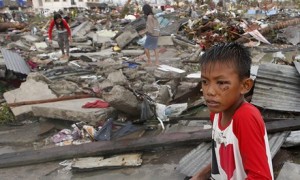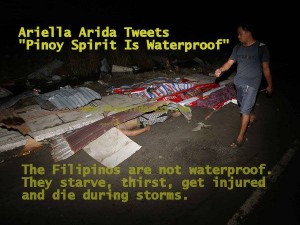After Anderson Cooper made a controversial report which highlighted how slow help was coming, he subsequently made a more patronizing message wherein he praised Filipino resilience after Typhoon Haiyan/Yolanda. It was like a sort of make-up for the first video. He probably realized he had irked a hypersensitive people, so he decided to make another one which was more “positive.” But unfortunately brought up more hype on the so-overused “resilience” of the Filipino. To be honest, I find it laughable.

Resilience becomes such a common word that it has become an excuse for lack of real preparation. Yes, the storm was stronger than most people expected, but it is still possible to avoid the number of deaths that came. Unfortunately, the attitude of Filipinos when it comes to disaster is something like, upon seeing a speeding bus that’s going for them but still far way, they wait for it to hit them and pray that they’ll survive through resilience instead of dodging it. I can’t help wonder if the national government was thinking this: forget thorough preparations, let the storm hit them, they’ll be OK and they’ll recover since they’re resilient anyway.
But let’s say Filipinos are resilient. Yes, many are. But let us not forget that other people are resilient too. Americans, Japanese and Haitians are all resilient.
| SUPPORT INDEPENDENT SOCIAL COMMENTARY! Subscribe to our Substack community GRP Insider to receive by email our in-depth free weekly newsletter. Subscribe to our Substack newsletter, GRP Insider! Learn more |
Japanese resilience after the 2011 quake is already self-explanatory because they are usually prepared and disciplined. Let’s move on to another case: Haitians. They were hit by a strong quake in 2010 and came under Hurricane Sandy in 2012. But the Haitians rebuilt their society after the quake and storm. They are also resilient.
Americans are resilient too. After Hurricane Katrina and many other storms that hit the United States, Americans battered by the storms also rebuilt their communities. They’re not the type to just sit down, cry and do nothing.
So we accept: Filipinos aren’t the only ones with resilience. Now let’s go to another useless boast that some Filipinos may be raising: Filipinos have more resilience than others. Again, completely wrong.
All countries in the world have the same levels of resilience. Contrary to what I have heard from some people, survivors in other countries are not the type who stay depressed, make mukmok (sulk) and don’t rebuild. Actually, they do. And contrary to what you believe, there are Filipinos who bog down, make mukmok (sulk) and don’t rebuild. We are not a people who are happy even if we lose our whole family. Actually, if people would compare resilience, I might argue (contrary to my earlier assertion) that Filipino resilience might be lower. A lot of families in Tacloban and other hit areas may not be able to rebuild what they lost, and may have to crowd into already shoulder-to-shoulder Metro Manila.
And again, about that “waterproof” comment:

Of course, resilience is better to have in any case. It is something you need when going through hardship, because you have to get up and keep going. But it is not something to be proud of. Resilience is not an achievement. It is nothing special.
If anything, this idea that Filipinos have special resilience, or in fact, any idea that Filipinos are special in anything, is hurting rather than helping Filipino efforts to rise up. It lulls Filipinos into a false sense of security. As a result, these Filipinos will believe everything is OK and they don’t need to do anything to have resilience. Unfortunately, this belief may have contributed to the high number of deaths in the Visayas after Haiyan.
Instead, Filipinos should realize that they have much work to do. I’m sure those in Tacloban and other hard-hit areas of the country already know that. It’s likely most of the Ivory Tower class in Manila and in government who just sit twiddling their thumbs while trying to believe that one need not do anything to be resilient.
Thus, after Haiyan, we have to redefine the concept of resilience, just as Haiti is doing. It seems that most concepts of resilience currently focus on foreign aid, which is true for the Philippines as well – and that might mean we’re not as resilient as advertised. That would need to change. We need to redefine resilience as being prepared. If anything, preparedness increases resilience. Unfortunately, a nation that’s versed only with short-term goals and general overconfidence in one’s current “resilience” is preventing such changes, and increasing the risk of greater loss of life in future storms and disasters.
- Killing “Fascists” will never save the world - January 20, 2026
- To Get Rid of Corruption, we need to Drastically Alter Filipino Culture to the point of being “UnFilipino” - November 24, 2025
- Why Transhumanism is Humanity’s Enemy, not its Future - May 4, 2025
“Resilience” is another opium that US sedated the Filipino mind into following her formula of nation’s success: Washington consensus.
That’s why BS Aquino’s govt is a headless chicken.
I make no bones about it . Pinoys who think they are God’s chosen
people above all other nations and races does set me off. Mentality like that started off the Klan. If that were true, would we have the president that we have now?
This would be more effective if what statement can be applied generally. I mean, I’ve heard and read Pinoys extolling a lot of things Pinoy (some deserved and some not), but never once have I encountered anyone anointing this country with some sort of divine mandate so much as existing. Maybe the Aglipayan and the Rizalista can claim that given their genesis stories, but I doubt it, and in any case they are the minority.
Perhaps a matter of not having seen enough in my lifetime? I’m usually alert to self-aggrandization of this kind, but I’m open to any observations and proofs.
Fail to plan. Plan to fail. Pinoys need to embed this in their minds. The islands had been hit by disastrous calamities yet pinoys never learn a damn thing. Being resilient is one thing. Seems like every human has that endearing quality in the face of hopelessness and despair. We pinoys are not unique. As i always says ” Don’t Bullshit the Bullshiter”.
I hear there are some amateur relief teams who went into the disaster zone and now find themselves stranded too. Next time you volunteer, make sure you remain an asset and not become a liability later.
Some of those amateur volunteers no doubt went in there looking for their kin. Granted, hindsight’s great, but you can’t blame them for taking this risk.
Especially if official channels were nonexistent or slow to organize.
What?!! A helper evolved into a victim himself? Evolution became so fast
Talk about reversal of luck..now they just added themselves to the count.
Volunteers should always have a good plan to get out of that disaster zone too, if they are just looking for their relatives who may still be alive then they should just take them and get out of there instead of adding up to the problem.
When I see the word “resilience,” I think of cockroaches. They can supposedly survive a nuclear bomb. Doesn’t that make them the most resilient of all? Yet in the end, they’re still cockroaches. So, really, the level of resilience one possesses is nothing to boast about.
I will slap the next person who tells me that the Filipino spirit is waterproof. These feel-good platitudes do nothing. Pinoys need to warm up to the idea that they deserve better rather than embrace this whole “pagtitiis” thing. It’s the same mentality that enables the typical Pinoy to put up with a government run by crooks.
Waterproof…hmm so I guess that’s one of those things that float on the water..hmm kinda like plastic or maybe something else..a certain T. :))
I read a lot of people in facebook asking for good vibes a lot..and yet at the end of the day they are pretty miserable lol.
On the contrary, I don’t even remember the Japanese holding up card boards saying “HELP US, WE NEED FOOD”.
Psychological Resilience is the ability of the mind to cope with : hardship, stress, etc…It’s not resilience that are in Filipinos. It is more of an attitude of: “bahala na”, “ningas cogon”…etc. Frustration that, they cannot do anything, anymore. It is the “Collective Unconsciousness” as the great German Psychologist , Carl Jung had theorized. The Third Realm of Unconsciousness in the brain. Frustration lead to Apathy. Wala na tayong magawa, Diyos na ang bahala…Mr. Aquino used this opportunity to blame his political opponents. To bring them down. And, to make himself look good to voters. Mr. Roxas even went far by: directing traffic ;and carried a sack of onion on his shoulder, for photo opportunities.